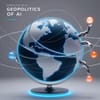As artificial intelligence continues to evolve, its geopolitical implications are becoming increasingly significant. Nations around the world are recognizing that AI technology is not just a tool for innovation but a strategic asset that can shape economic power and national security.
Countries leading the charge in AI development, such as the United States and China, are heavily investing in research and talent acquisition. This competition has sparked a race to dominate the AI landscape, with each nation striving to establish its technological supremacy. The implications of this rivalry extend beyond economics; they also encompass military applications, surveillance capabilities, and data governance.
Moreover, AI's impact on international relations cannot be understated. Countries with advanced AI capabilities can exert influence over global standards and norms, shaping how technology is used and regulated. This power dynamic creates opportunities for collaboration but also poses risks of tension and conflict.
Ethical considerations are also at the forefront of the AI discourse. Nations are grappling with the implications of AI on privacy, employment, and human rights. As AI systems become more integrated into society, the need for international cooperation on ethical frameworks and regulations is paramount.
In response to these challenges, there is a growing call for dialogue among nations to address the ethical and strategic dimensions of AI. Collaborative efforts could help mitigate risks and foster an environment where AI can be harnessed for the greater good.


